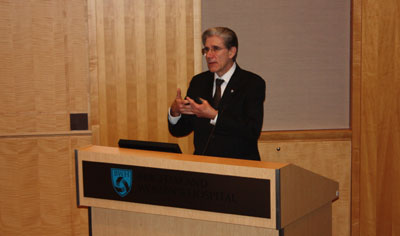Transforming Medical
Education

Julio Frenk, dean of the Harvard School of Public Health, presents “Transforming Health Professions Education for a Second Century” at a special Department of Medicine 100th Anniversary Medical Grand Rounds. |
Early this month, Julio Frenk, MD, MPH, PhD, dean of the Harvard School
of Public Health, presented on the transformation of health professions education
as part of the Department of Medicine's special 100th anniversary Medical
Grand Rounds.
"Julio served as Mexico's minister of health from 2000 to
2006 and was the 2008 recipient of the Clinton Global Citizens Award," said BWH
President Betsy Nabel, MD, in her introduction of Frenk. "In addition to these
and other distinctions, Julio is an extraordinary person and humanitarian."
Frenk's talk took attendees back to the 1913 formation of
the Harvard School of Public Health, which like BWH's predecessor hospital, the
Peter Bent Brigham, is also celebrating its centennial this year. The school,
then called the Harvard-MIT School of Health Officers, was the first
professional public health training program in the U.S.
"The story of the Brigham and the Harvard School of Public
Health is a tale of two centennials and amazing collaboration," said Frenk, a
global health authority who has served as dean since 2009. "Half of the faculty
with appointments at the school come from the Brigham. We have shared research
studies, including the Nurses' Health Study I and II, as well as shared
teaching. From patient safety to duty hour reform to global health, the Brigham
is at the forefront of the transformation of medical education."
Frenk focused on the vital role that knowledge plays when it comes to individual
behavior and health outcomes. For example, at the turn of the 20th century,
life expectancy in the U.S. was 30 years, he said. By 1984, life expectancy
doubled to 65 years.
"What drove this amazing transformation?" Frenk asked. "There is a
correlation between a country's improved wealth and health, but there has to be
something else. That something else is knowledge."
Knowledge leads to new technologies and evidence, which then influence
human behavior and public policy, he explained. Knowledge empowers people to
make informed decisions and drives policy changes. "The health profession is
key to each of these mechanisms," Frenk said.
Frenk also traced the evolution of what he called the three generations
of medical education reforms, beginning a century ago with science-based
learning in universities and affiliated teaching hospitals. In the 1970s, problems-based
learning-primarily occurring in academic centers-emerged and supplemented
science-based learning. This eventually led to the present generation of
systems-based learning, happening across health care and education systems.
"If we want to continue to advance medical education into the 21st
century, investment in health education will be critical," Frenk said, sharing
surprising statistics. In 2008, less than 2 percent of the world's $5.5
trillion in health expenditures went toward medical education.